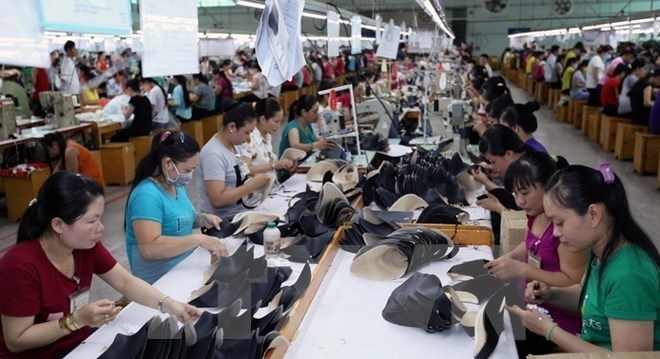
According to the Vietnam Leather, Footwear and Handbag Association (Lefaso), the country’s leather industry is enjoying good chances to benefit from the shift of orders from China as a result of the tendency of moving to the production of high-tech goods.

Illustrative image (Photo: VNA)
Industry sources also said the signing of a number of trade
agreements like the Vietnam
– EU Free Trade Agreement (EVFTA) and the Comprehensive and Progressive
Agreement for Trans-Pacific Partnership (CPTPP) is ushering in chances of
development for Vietnam,
especially in attracting investment and boosting export to the markets in the
EU and CPTPP members.
Lefaso president Nguyen Duc Thuan
affirmed that export activities of Vietnam’s leather industry are
seeing a stable growth with positive signs for the second half of this year and
the years to come. The forecast for the world economy in 2018 is rosy, that is
why the demand in Vietnam’s
major export markets like the US,
the EU, China, Japan and the Republic of Korea
will be better than that in 2017.
China is believed to continue the policy of
reducing investment incentives in the industries of garment and leather to
focus on high-tech ones, and orders for footwear and handbags is expected to
keep moving from China to Vietnam in
anticipation of chances created by those FTAs. However, Vietnam’s
leather industry is now facing numerous difficulties like rising labor costs
and low productivity compared to other countries in the region. Especially, the
Fourth Industrial Revolution will also cause impact on the enterprises in the
industry as they will head to investing in modern machinery and reducing work
hands.
The leather industry’s production is
planned to turn out about 279 million pairs of footwear in this year, with 72
million pairs in the third quarter and 80 million pairs in the last.
The first half of this year continued to witness
a growth in the production by the industry, with 127.4 million pairs produced,
an increase of 5.1% year-on-year. They brought back US$9.45 billion to the
country, rising by 8.4% compared to the same period last year. The export
revenue of this kind of product is forecast to reach US$19.5 billion, or 10%
higher than the figure recorded in 2017.
Source: NDO
Anyone found to be encroaching upon the forest, even if it is just one bamboo shoot, will face penalties. This commitment has been unanimously added into the covenant of Bua Cau hamlet, Hung Son commune in Kim Boi district, to protect the forest.
The Hoa Binh Power Corporation (PC Hoa Binh) has applied synchronous measures to gear up for the coming summer season when power consumption demand surge may cause a risk of power supply disruption.
Appreciating the abundant potential and strengths of his hometown for tourism development, Ha Cong Hung, Deputy Secretary of the youth union of Mai Chau district’s Mai Hich commune, embarked on producing smoked meat with a desire to introduce his homeland's specialty to domestic and international tourists.
Hoa Binh farmers are investing big in their chilli pepper cultivation areas after the first batch of 7.5 tonnes of pickled chilli peppers was shipped to the Republic of Korea (RoK) by Tien Ngan Trade and Investment Co., Ltd last month.
Recognising the role and importance of developing the collective economy, the northern province of Hoa Binh has promptly issued support policies to propel the development of the economy, making important contributions to local socio-economic development.
Prime Minister Pham Minh Chinh attended a groundbreaking ceremony for an electronic printed circuit board (PCB) factory at Da River Left Bank Industrial Park in Hoa Binh province on April 13. The electronic PCB factory is invested by Japan's Meiko Group at a total cost of 200 million USD.



